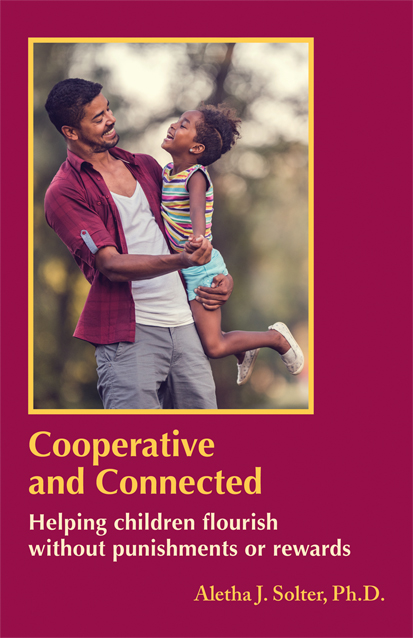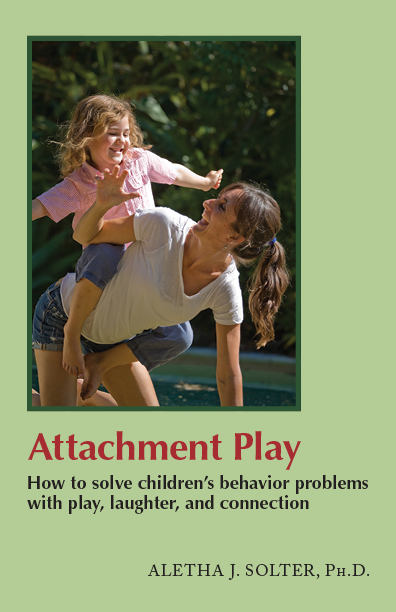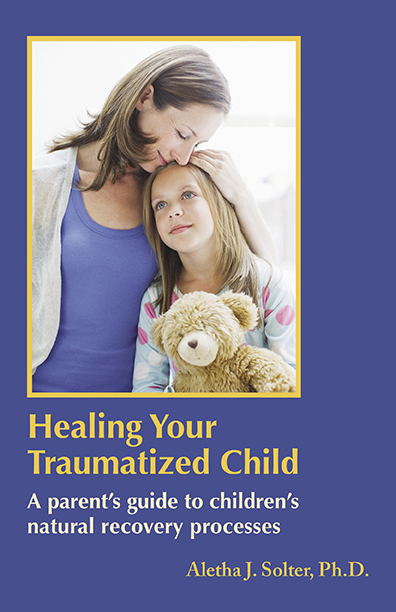My sweet baby has turned into a troubled five-year-old
by Aletha Solter, Ph.D.
Question:
When my son was a baby/toddler everybody said he was sweet and adorable, and they loved having him around. I felt lucky to have such a good child that was no trouble for anybody. When he was 18 months old my husband got a new job in another state, and, until our house sold, my son and I stayed behind. Then my son got sick (I had to watch his breathing), and while at the doctor's they found he had a hearing problem (needed tubes in his ears and his adenoids out). All that happened without his daddy around. A few months later we moved to where my husband was. My son was heart-broken to leave his grandparents behind. After nine months the church we were going to said my son was a demon and should not be around normal children. So he had to leave his friends there and go to another church. Now he is almost five and his preschool is complaining. What happened? Is there any hope to help him get back to the way he was?
Answer:
Assuming your son has no residual medical problems, it sounds as if he is suffering from the effects of accumulated stress. He has experienced separations, illness, surgery, and a move to a new home, and he probably has an accumulation of grief, frustration, and anxiety. Stress and trauma are major causes of violent and obnoxious behavior in young children.
I recommend that you make every possible effort to reduce stress for him now by not overstimulating him or overstructuring his life. Give him plenty of free, unstructured time to play. He will also benefit from lots of attention and cuddling, as well as special, relaxed play times with you every day, doing what he requests while you give him your full attention. I also suggest that you reduce or eliminate screen time, especially frightening or violent scenes in videos. You do not mention your approach to discipline, but I recommend for all children gentle methods of discipline with no punishment of any kind.
Children have inbuilt mechanisms to recover from stress and traumatic experiences. Specific kinds of play can be very therapeutic. Encourage your son to re-enact through play past frightening experiences, such as doctor visits, saying goodbye to grandparents, or moving to a new home. For example, you can give him a doctor kit and invite him to play doctor with you. He will probably find ways to use the materials and your attention to create meaningful, therapeutic play that will help him work through some of the frightening or painful experiences he has had with doctors and illnesses.
Children also use tears and tantrums to heal themselves from stress and trauma. Don't try to stop your son from crying or having a temper tantrum. It is important to allow him to express himself in these ways, even though his emotional outbursts may seem totally out of proportion to the events that trigger them. If you can stay close and listen lovingly when he cries or rages, you will help him recover from his past experiences.
If your son acts hurtfully towards other people (by hitting, kicking, or biting), you may need to intervene by using firm, but loving, physical restraint. You can do this without anger or punishment. Simply step in as needed, hold him firmly, and explain that you can't let him hurt other people. Setting limits in this way often triggers a healthy release of tears and rage, and this emotional outburst will be beneficial for him. Your goal is to stop the violence but to allow him to express his emotions.
If you have tried the above suggestions but do not see any improvement in your son's behavior, I recommend that you take him to a qualified therapist who knows how to help children recover from the effects of stressful and traumatic experiences.
About Aletha Solter
Aletha Solter, PhD, is a developmental psychologist, international speaker, consultant, and founder of the Aware Parenting Institute. Her books have been translated into many languages, and she is recognized internationally as an expert on attachment, trauma, and non-punitive discipline.
Aware Parenting is a philosophy of child-rearing that has the potential to change the world. Based on cutting-edge research and insights in child development, Aware Parenting questions most traditional assumptions about raising children, and proposes a new approach that can profoundly shift a parent's relationship with his or her child. Parents who follow this approach raise children who are bright, compassionate, competent, nonviolent, and drug free.
For more information about this topic, see Aletha Solter's books, Cooperative and Connected, Attachment Play, and Healing Your Traumatized Child.


